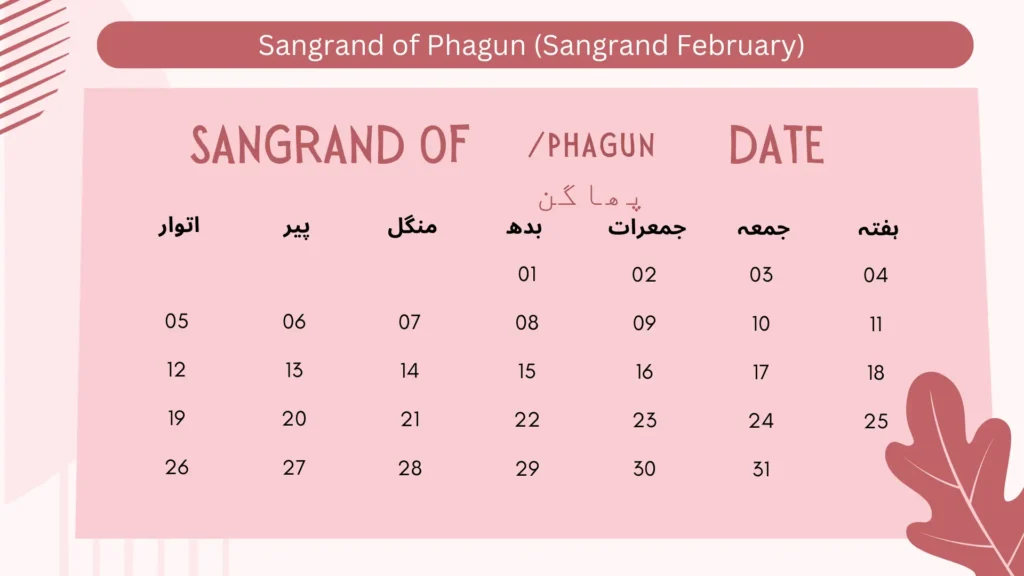Sangrand of Phagun in February According to the Nanakshahi Samvat Calendar
On the 12th of February, there is the Sangrand of Phagun, also known as Phalgun. On this day, Sikhs celebrate the Sangrand of the final month of the year according to Sahib Siri Guru Nanak Dev Sahib Ji and Siri Guru Arjan Dev Sahib Ji through their bani (ਬਾਣੀ – words of the Guru) of Barah Maha (ਬਾਰਹ ਮਾਹਾ – the twelve months).
You can view the list of all Sangrand dates for each month in the current year. You can also see the English calendar dates for Sangrand in January, March, April, May, June, July, August, September, October, November, and December for the current year.

Sangrand of Phagun and its Spiritual Teachings
Phalgun or Sangrand of Phagun, as it has now developed in the Punjabi language. Satguru (ਸਤਿਗੁਰੂ – true Guru) Siri Guru Arjan Dev Sahib Ji teaches in the Phalgun Anand Uparjana (ਫਾਲਗੁਣ ਆਨੰਦ ਉਪਜਣਾ):
“Har (ਹਰਿ – name for God) Sajan (ਸੱਜਣ – friend) Pargate Ai (ਪ੍ਰਗਟੇ ਆਏ – has appeared).”
Understanding Anand and Uparjana
During the Sangrand of Phagun, in this month of Phagun, Ananda Uparjana (ਆਨੰਦ ਉਪਜਣਾ – bliss arises). Anand (ਆਨੰਦ – bliss) is that true extreme bliss. Uparjana (ਉਪਜਣਾ – arises) means to come forth, be born, to grow. That Anand is born, has come forth, has grown when: “Har Sajan Pargate Ai.”
The Role of Hari in Our Spiritual Journey During Sangrand of Phagun
Hari, the all-pervading Waheguru (ਵਾਹਿਗੁਰੂ – wondrous Lord), Har, the one who makes us blossom from within, takes away negativity, and so we blossom with Shubh Gun (ਸ਼ੁਭ ਗੁਣ – good characteristics, good qualities), with only positivity. Har, Hari Parmesar (ਹਰੀ ਪਰਮੇਸਰ – God), Hariya Parya Karnavala (ਹਰਿਆ ਪਰਿਆ ਕਰਨ ਵਾਲਾ – the one who nurtures). Sajan means friend because they are our friends. They are our husband, Lord. We are the soul brides, and they are the husband, Lord.
“Har Sajan Pargate Ai” means they have appeared where they first weren’t present. So, they weren’t present because we have been traveling in the 8.4 million birth and death life cycle, and we have engrossed ourselves in the illusion of Maya (ਮਾਇਆ – illusion). And so, when we are engrossed in Maya, in ego, in attachment, our husband lord, Hari Parmesar Waheguru, will not be present. But now we have broken free from that, they are present.
Achieving True Bliss and Oneness During Sangrand of Phagun
“Har Sajan Pargate Ai”—they have come forth. They are now present with us, our beloved friend, our husband lord, Akal Purkh Waheguru (ਅਕਾਲ ਪੁਰਖ ਵਾਹਿਗੁਰੂ timeless being).
The Journey to Extreme Bliss
So, how do we get extreme bliss this month in Phagun, Phalgun Anand Uparjana? Bliss. How do we bring forth that bliss of no duality? Anand can be translated as extreme bliss. But when you have extreme bliss, there is no duality. Anand (ਆਨੰਦ bliss) and Duh (ਦੁਹ duality), Dvait (ਦਵੈਤ duality), Pavana (ਪਾਵਨਾ feeling), An (ਅਨ without), so no duality is extreme bliss.
Uparjana – we get that true extreme bliss when our husband lord has come forth and is present: “Har Sajan Pargate Ai.”
The Path to Unity with the Divine
So, we only get that true bliss when Hari Parmesar Waheguru, our husband lord, is present when we are one with them. And how do we become one with them? We become one with them by following their path, by stepping on the path, by following the teachings of our Satguru (ਸਤਿਗੁਰੂ – faithful Guru), through the spirituality teachings from Sri Guru Granth Sahib Ji and our Rahat (ਰਹਤ – discipline), from the Guru Khalsa (ਗੁਰੂ ਖਾਲਸਾ – pure ones).
When we follow those teachings, and we act upon the teachings, then Hari Parmesan comes forth, we come outside of that Maya, and our Sajan, our friend, our beloved husband Akal Purkh Waheguru, is then present with us, and then that extreme bliss comes forth.
Developing the Extreme Bliss of Anand
Now, how do we develop that extreme bliss? We can develop the extreme bliss that Anand and then Hari Parmesan come forth. So, another way of translating this is Phalgun Anand Uparjana: as extreme bliss develops, Uparjana is born and comes forth. As it grows, then what happens?
“Har Sajan Pargate Ai.”
Two Types of Bliss: Pajan Anand and Kana Anand During Sangrand of Phagun
So, if we translate this the reverse way as we read, then when we start developing extreme bliss, when we have extreme bliss, Anand, when we have no duality, then:
“Har Sajan Pargate Ai.”
Then, our husband, Lord Akal Purkh Waheguru, becomes present and is one with us. So, what types of bliss are there? Anand. Scholars describe two kinds of Anand. There’s a type of Pajan Anand (ਪਜਨ ਆਨੰਦ – bliss from recitation), so when we are reciting the name of the Lord when we are engrossed in the name when we are one with the Lord reciting the name, we get extreme bliss from that, Anand.
Sometimes, we describe it like that. But then, when we stop, or we become away from the Sangat (ਸੰਗਤ – holy congregation) when we’ve been blessed with a great gift, then our great Gata (ਗਾਤਾ – song), and we are engrossed in that, and we receive that bliss by listening and focusing on that. But when we come out of the Sangat and away from that, that bliss goes away.
For example, when it rains and stops raining, we’re not wet anymore. We dry. So, when that rainwater comes and showers on top of us, we feel that bliss. But when we dry out, it’s an example of when that rain dries out, and then that bliss disappears. That’s called Pajan Anand. That’s Anand. When engrossed in Pajan, we focus on the Lord’s name.
And there’s something called Kana Anand (ਕਾਨਾ ਆਨੰਦ – eternal bliss). Kana Anand is a type of Anand, the kind of bliss that lasts forever and ever. So, if you think of streams and rivers, when it rains, they overflow, and there’s a lot of water in them. But in some places of the world, in the summer months, when it stops raining, the rivers can dry out, and the streams can dry out; there’s no water there.
That’s like I was describing Pajan Anand. But in the ocean, the water in the sea never finishes. It’s full of water. So, in that way, Kana Anand is where the bliss never finishes, where it doesn’t decrease, where it’s there forever, where we’re in extreme happiness, extreme oneness with the Lord when we have complete oneness. There is ultimately no duality at all.
Achieving Kana Anand During Sangrand of Phagun
So, when we develop Kana Anand, Phalgun Anand Uparjana, when we create and that Anand, that Kana Anand comes forth, that Anand, that bliss that doesn’t finish, then “Har Sajan Pargate Ai.” And how do we get that? By repeating the name of the Lord. We go through those phases first, like when we take medicine. Sometimes a medicine takes Sava; it’s Gauri (ਸਵਾ, ਗੌਰੀ – bitter), and we don’t want the medicine. But the medicine is working for us. And as it works for us, we know we develop. Then you move into Pajan Anand, where you take that bliss while we’re doing that Pajan, and then Kana Anand, where that bliss never finishes.
The Role of Bani and Satguru During Sangrand of Phagun
So, in this month of Phalgun, as the Bani describes, Sangrand of Phagun, as we say it now, two things. We follow the teachings of our Satguru, and then, in that way, our Sajana, our husband Lord, when we remove ourselves from Maya, they come forth, Pargate Ai, and then we receive that faithful Anand, we break free from duality. At the same time, in Phalgun, if we repeat the name of the Lord, we develop through the stages of Anand, and we reach that stage of Kana Anand that Anand never finishes. And when that Anand never finishes, our husband Lord, “Har Sajan Pargate Ai,” comes forth.
Conclusion
So, in this month of Phagun, the 12th month of the year, the final month of the year, on this day of Sangrand of Phagun, and for the whole of this month, let us focus on the teachings of our Guru. Let us listen, believe, and follow those teachings. Let us repeat the name of the Lord, so we gain that Anand, and our Sajjan, our beloved husband Lord, comes forth and is Pargate Ai, and we become one with them.
